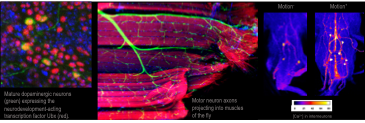Raouf Issa - Maintenance of the nervous system & behaviour
 In all animals, the optimal functioning of the nervous system at every stage of life is essential to support appropriate behaviour. Impairments in this function are associated with neurodevelopmental and/or neurodegenerative conditions, which have a significant impact on quality of life. However, how such function is maintained throughout life remains poorly understood.
In all animals, the optimal functioning of the nervous system at every stage of life is essential to support appropriate behaviour. Impairments in this function are associated with neurodevelopmental and/or neurodegenerative conditions, which have a significant impact on quality of life. However, how such function is maintained throughout life remains poorly understood.
Neurons that underlie adult behaviours are largely established during early embryonic development. A key challenge is the lifetime maintenance of their function. This is because the nervous system changes in response to developmental cues, environmental shifts, and disease. Once established, neurons must strike a balance between stability and adaptability (plasticity): stability preserves essential properties such as neuronal activity and neurotransmitter release, while plasticity enables the remodelling of specific features, such as neurite arborisation or synapse density. Evidence suggests that these processes are regulated by intrinsic programmes (i.e. gene regulatory factors) and extrinsic stimuli (e.g. neuronal activity).
Our research investigates (i) how gene regulators from developement influence the physiology and plasticity of post-mitotic neurons over time, and ii) how disruptions in these regulators contribute to the onset and progression of neurological diseases in the locomotor system—an evolutionarily conserved, innate, and early-developing neural system.


